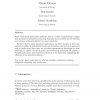Free Online Productivity Tools
i2Speak
i2Symbol
i2OCR
iTex2Img
iWeb2Print
iWeb2Shot
i2Type
iPdf2Split
iPdf2Merge
i2Bopomofo
i2Arabic
i2Style
i2Image
i2PDF
iLatex2Rtf
Sci2ools
100
click to vote
DKE
2008
2008
On space constrained set selection problems
Space constrained optimization problems arise in a variety of applications, ranging from databases to ubiquitous computing. Typically, these problems involve selecting a set of items of interest, subject to a space constraint. We show that in many important applications, one faces variants of this basic problem, in which the individual items are sets themselves, and each set is associated with a benefit value. Since there are no known approximation algorithms for these problems, we explore the use of greedy and randomized techniques. We present a detailed performance and theoretical evaluation of the algorithms, highlighting the efficiency of the proposed solutions. Key words: space constrained set selection problem, optimization problem, ubiquitous computing, data warehouses
Related Content
| Added | 10 Dec 2010 |
| Updated | 10 Dec 2010 |
| Type | Journal |
| Year | 2008 |
| Where | DKE |
| Authors | Themis Palpanas, Nick Koudas, Alberto O. Mendelzon |
Comments (0)

